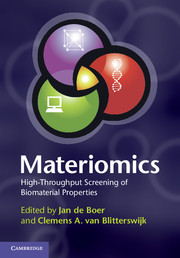Book contents
- Frontmatter
- Contents
- List of contributors
- Preface
- Chapter 1 Introducing materiomics
- Chapter 2 Physico-chemical material properties and analysis techniques relevant in high-throughput biomaterials research
- Chapter 3 Materiomics using synthetic materials: metals, cements, covalent polymers and supramolecular systems
- Chapter 4 Microfabrication techniques in materiomics
- Chapter 5 Bioassay development
- Chapter 6 High-content imaging
- Chapter 7 Computational analysis of high-throughput material screens
- Chapter 8 Upscaling of high-throughput material platforms in two and three dimensions
- Chapter 9 Development of materials for regenerative medicine: from clinical need to clinical application
- Chapter 10 Non-biomedical applications of materiomics
- Chapter 11 Beyond bed and bench
- Index
Preface
Published online by Cambridge University Press: 05 April 2013
- Frontmatter
- Contents
- List of contributors
- Preface
- Chapter 1 Introducing materiomics
- Chapter 2 Physico-chemical material properties and analysis techniques relevant in high-throughput biomaterials research
- Chapter 3 Materiomics using synthetic materials: metals, cements, covalent polymers and supramolecular systems
- Chapter 4 Microfabrication techniques in materiomics
- Chapter 5 Bioassay development
- Chapter 6 High-content imaging
- Chapter 7 Computational analysis of high-throughput material screens
- Chapter 8 Upscaling of high-throughput material platforms in two and three dimensions
- Chapter 9 Development of materials for regenerative medicine: from clinical need to clinical application
- Chapter 10 Non-biomedical applications of materiomics
- Chapter 11 Beyond bed and bench
- Index
Summary
It’s that sense of unease when you step out of the airport terminal building and onto the streets of Kathmandu. Or the moment when you open the door to your new office to see unfamiliar faces waiting for you. Step out of your comfort zone and discover how exciting, thrilling and liberating it can be: a new world is waiting for you. This book is about stepping out of the comfort zone of your own scientific discipline and about exposing yourself to something new. Embrace all the scientific disciplines that build modern-day biomaterials research, in the cultural hotpot of materiomics. Don’t let the jargon and three-letter abbreviations of cell biology hold you back, nor the abracadabra of statistical models, nor the Latin terms for body parts and diseases. Learn a new language and a whole new culture is waiting for you.
The compilation of this book was initiated after an exciting conference termed ‘High throughput screening of biomaterials: shaping a new research area’, held beside the Amsterdam canals in April 2011. The meeting was attended by 50 selected scientists from all over the globe and across all the disciplines of biomaterials research, and the format of the conference took away that sense of unease. Chemists talked to clinicians, biologists listened to information scientists, engineers brainstormed with policy makers. We decided to bring this open and inviting atmosphere to the public through this book. Therefore, each chapter contains a tutorial on the topic for non-experts, gives an overview of the current status of that field and discusses how this technology will further shape the future of materiomics. The result of this exciting journey is presented here and was made possible only with the help of all the authors and those who contributed to the organization of the conference (Anouk Mentink), the editing of the book (Ruben Burer) or the chapters (Kristen Johnson). We hope that this book will be a scientific passport which lets you travel across the border of your discipline and helps you to learn to appreciate that of others. You won’t be disappointed. Enjoy your journey!
- Type
- Chapter
- Information
- MateriomicsHigh-Throughput Screening of Biomaterial Properties, pp. xiii - xivPublisher: Cambridge University PressPrint publication year: 2013



